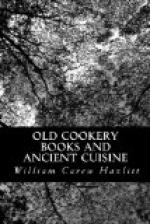“When I hied me into East Cheap:
One cries ribs of beef, and many a pie:
Pewter pots they clattered on a heap;
There was harp, fife, and sautry.”
The mention of pewter is noteworthy, because the Earl of Northumberland ate his dinner off wood in 1572. Pewter plates had not long been given up when I joined the Inner Temple in 1861.
There is a still more interesting allusion in the interlude of the “World and the Child,” 1522, where Folly is made to say:—
“Yea, and we shall be right welcome,
I dare well say,
In East Cheap for to dine;
And then we will with Lombards at passage
play,
And at the Pope’s Head sweet wine
assay.”
The places of resort in this rollicking locality could furnish, long before The Boar made the acquaintance of Falstaff, every species of delicacy and bonne bouche to their constituents, and the revelry was apt sometimes to extend to an unseasonable hour. In an early naval song we meet with the lines:
“He that will in East Cheap eat
a goose so fat,
With harp, pipe, and song,
Must lie in Newgate on a mat,
Be the night never so long.”
And these establishments infallibly contributed their quota or more to the prisons in the vicinity.
Houses of refreshment seem, however, to have extended themselves westward, and to have become tolerably numerous, in the earlier society of the sixteenth century, for Sir Thomas More, in a letter to his friend Dean Colet, speaking of a late walk in Westminster and of the various temptations to expenditure and dissipation which the neighbourhood then afforded, remarks: “Whithersoever we cast our eyes, what do we see but victualling-houses, fishmongers, butchers, cooks, pudding-makers, fishers, and fowlers, who minister matter to our bellies?” This was prior to 1519, the date of Colet’s decease.
There were of course periods of scarcity and high prices then as now. It was only a few years later (1524), that Robert Whittinton, in one of his grammatical tracts (the “Vulgaria"), includes among his examples:—
“Befe and motton is so dere, that a peny worth of meet wyll scant suffyse a boy at a meale.”
The term “cook’s-shop” occurs in the Orders and Ordinances devised by the Steward, Dean, and Burgesses of Westminster in 1585, for the better municipal government of that borough.
The tenth article runs thus:—“Item, that no person or persons that keepeth or that hereafter shall keep any cook’s-shop, shall also keep a common ale-house (except every such person shall be lawfully licensed thereunto), upon pain to have and receive such punishment, and pay such fine, as by the statute in that case is made and provided.”
But while the keepers of restaurants were, as a rule, precluded by law from selling ale, the publicans on their side were not supposed to purvey refreshment other than their own special commodities. For the fifteenth proviso of these orders is:—




